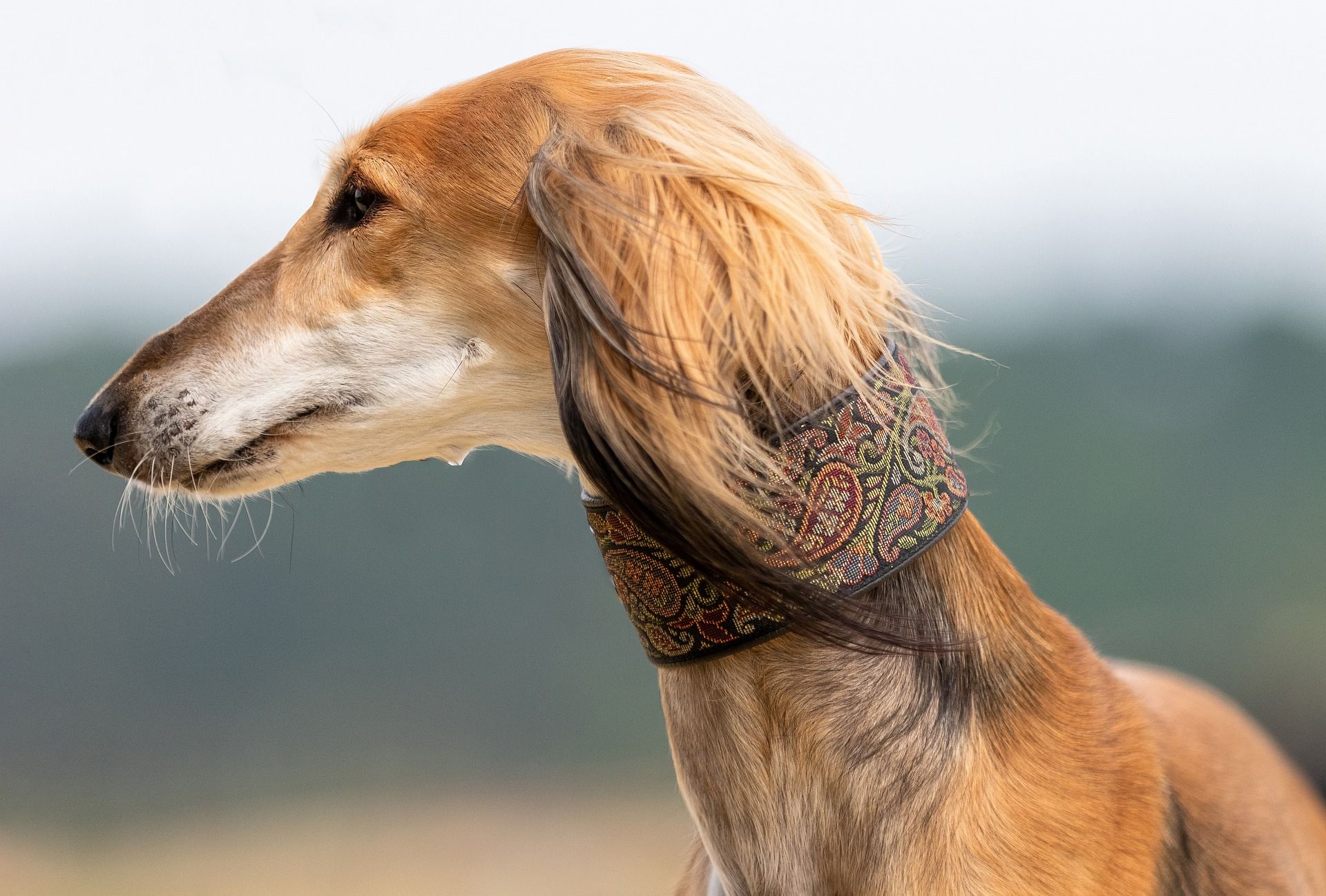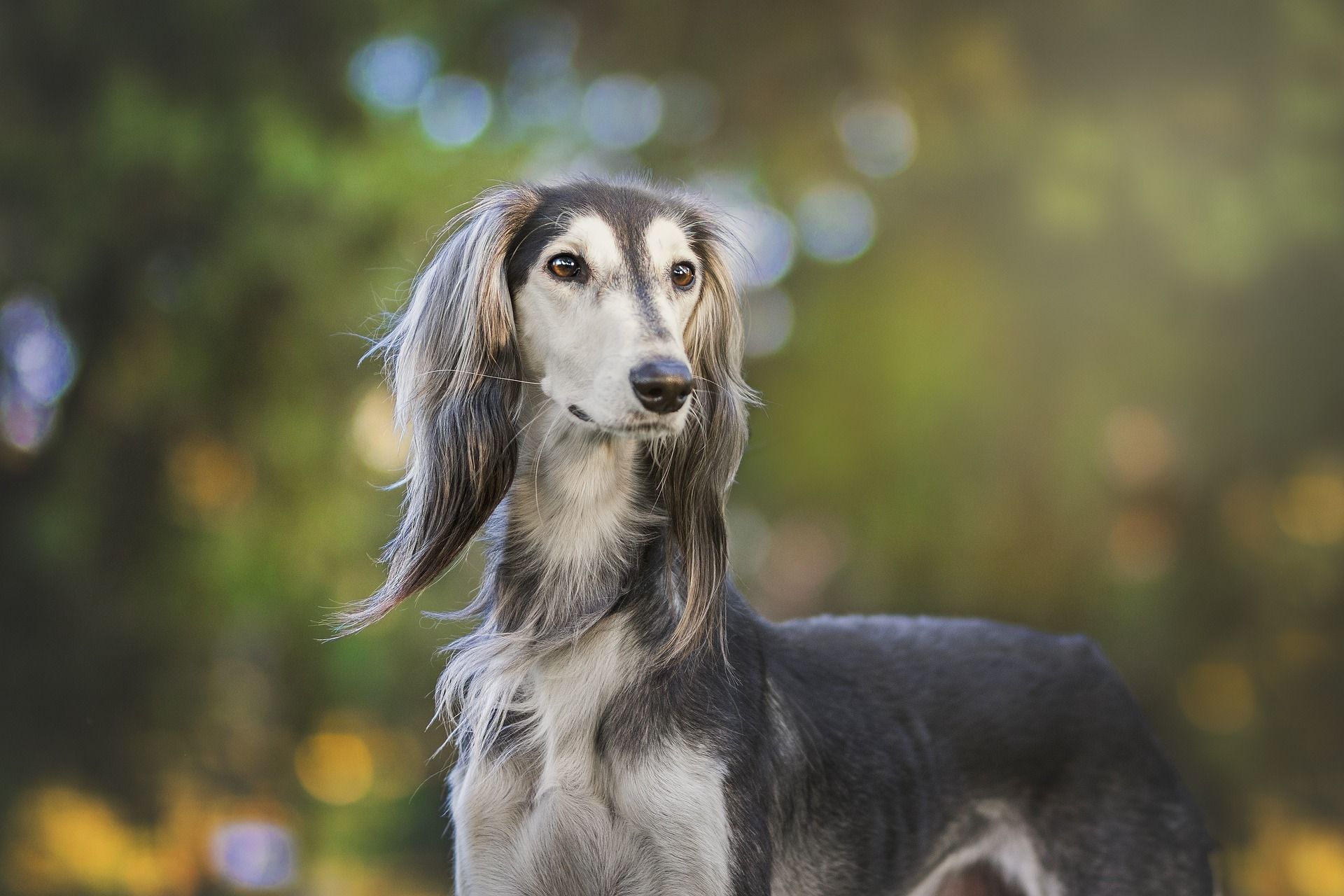Prices of puppies for most breeds range between a few hundred to a couple thousand dollars. Salukis typically start at $800 and can cost $2500 or more

Table of Contents
How much do Saluki pups cost?
Although the cost of Saluki puppies can vary widely depending on factors we outline in the sections below, generally, Saluki puppies from reputable breeders can range from $800 to $2,500 or more.
As a general guideline, prices for puppies from reputable breeders can range from a few hundred dollars to a couple of thousand dollars or more. Adoption fees for puppies from rescue organizations or shelters are generally more affordable, typically ranging from $50 to a few hundred dollars.
It’s important to note that the initial cost of acquiring a puppy is just one aspect of the overall expenses associated with Saluki ownership.
To get accurate and up-to-date information on Saluki puppy prices, it is recommended to contact reputable Saluki breeders directly.
Reputable breeders prioritize the health and well-being of the dogs, follow ethical breeding practices, and provide necessary health certifications for their puppies.
Additionally, potential dog owners may also consider adopting a Saluki from rescue organizations or shelters. Adoption fees for rescue dogs are generally more affordable than purchasing from a breeder, and it provides a loving home for a dog in need.
Why are Salukis so expensive?
Several factors contribute to the relatively high cost of Salukis, and these factors are common across many purebred dogs. Here are some reasons why Salukis may be considered expensive:
#1 — Reputable Breeding Practices
Responsible and ethical breeders invest time and resources into ensuring the health, well-being, and proper development of their dogs. Among other things:
- Reputable breeders have a deep understanding of the Saluki breed
- Responsible breeders carefully select breeding pairs based on factors such as temperament, health, conformation to breed standards, and genetic diversity
- Dogs in reputable breeding programs are treated ethically and provided with proper care, including a nutritious diet, regular veterinary check-ups, and comfortable living conditions.
- Puppies from reputable breeders are well-socialized from an early age.
- Reputable breeders are dedicated to improving the breed.
- Reputable breeders are transparent about their breeding practices.
- Responsible breeders view their responsibility as extending beyond the puppy sale.
- Puppies are not separated from their mothers too early
- Reputable breeders provide appropriate vaccinations, deworming, and other preventative care measures to ensure the health of the puppies.
It’s important for potential Saluki owners to thoroughly research and choose breeders who adhere to these practices. Purchasing a Saluki from a responsible breeder increases the likelihood of acquiring a healthy, well-socialized dog that conforms to breed standards.
#2 — Health Screening
Reputable breeders often conduct health screenings to identify and prevent genetic disorders that may be prevalent in the breed. These screenings can involve costly tests and certifications.
Health screening for Salukis involves a series of tests and evaluations conducted by responsible breeders to assess the overall health and genetic well-being of their breeding dogs. The goal is to identify potential hereditary conditions or health issues and make informed breeding decisions to promote the health of future generations of Salukis.
They include genetic testing, hip dysplasia evaluation, eye examinations, cardiac evaluations, thyroid testing, blood tests, reproductive health tests, and behavioural assessments.
#3 — Champion Bloodlines
Salukis from champion bloodlines, meaning they have ancestors that have excelled in conformation shows or other competitions, may command higher prices due to the perceived quality and pedigree of the lineage.
When a Saluki is said to come from champion bloodlines, it means that one or both of its parents, as well as possibly earlier ancestors, have been recognized as champions in the context of dog shows or competitions.
In conformation shows, judges evaluate dogs against the breed standard, which is a set of criteria that defines the ideal characteristics of the breed. Dogs that closely match the standard and exhibit desirable traits are awarded championship titles.
Champions can earn various titles, such as “Champion” or “Grand Champion,” depending on the number of wins and other achievements.
#4 — Show or Breeding Potential
Dogs intended for show or breeding purposes, which meet specific breed standards, are usually priced higher than those sold as companion pets with limited registration.
This largely refers to the qualities and characteristics that make a Saluki well-suited for participation in conformation shows or for contributing positively to the breed through responsible breeding.
The key concerns here are conformation to breed standards, physical appearance, temperament, movement and gait, show ring presence and judges evaluations.
#5 — Care for Dam and Puppies
Ethical breeders provide proper care for the mother (dam) before, during, and after pregnancy. They also invest time and resources in socializing and caring for the puppies, ensuring they are well-adjusted and healthy.
#6 — Selective Breeding
Reputable breeders carefully select breeding pairs based on temperament, health, and adherence to breed standards. This selective breeding process takes time and expertise.
#7 — High-Quality Nutrition
Proper nutrition is crucial for the health and development of the dogs. Reputable breeders invest in high-quality dog food and supplements to ensure the best possible start for the puppies.
#8 — Ongoing Support
Responsible breeders often provide ongoing support to the new owners, offering guidance on training, health care, and general well-being. This commitment to the dogs extends beyond the initial sale.
#9 — Limited Number of Litters
Ethical breeders focus on the quality rather than the quantity of litters. This often means they have a limited number of litters each year, contributing to the exclusivity and potentially higher price of the puppies.
It’s important to note that while the upfront cost of purchasing a dog from a responsible breeder may be higher, it can be a worthwhile investment in terms of the dog’s health, temperament, and overall well-being. Additionally, supporting ethical breeding practices helps ensure the continuation of healthy and well-adjusted breeds. If cost is a concern, potential dog owners can also consider adopting from reputable rescue organizations or shelters, where fees are generally lower.
What causes the difference in the price between dog breeds?
The pricing of dog breeds can vary widely based on several factors:
- Breed Rarity: Rare breeds are often priced higher due to their scarcity.
- Popularity: Popular breeds may have higher prices due to increased demand.
- Breeder Reputation: Reputable breeders with a positive track record may charge higher prices.
- Pedigree and Bloodlines: Dogs with champion bloodlines or prestigious pedigrees may be priced higher.
- Show or Breeding Potential: Dogs intended for show or breeding purposes may be priced higher than companion pets.
- Health Certifications: Breeders who invest in health screenings for breeding dogs may charge more for their puppies.
- Training: Dogs that have undergone basic training or have specific skills may be priced higher.
- Geographical Location: Prices can vary based on the cost of living in different regions.
- Economic Conditions: Economic factors, including inflation and overall economic conditions, can influence dog prices.
- Age: Puppies are generally more expensive than older dogs.
- Gender: Intact females or males intended for breeding may be priced differently.
- Coat Color and Markings: Specific coat colors or markings may be considered more desirable, impacting the price.
- Size: Larger or smaller sizes within a breed may affect pricing.
- Limited Litters: Breeders who focus on quality and produce a limited number of litters may charge higher prices.
- Breeder’s Business Model: Some breeders operate as a hobby, while others run breeding programs as a business, impacting pricing.
- Inclusions: What is included in the purchase price, such as vaccinations, microchipping, or spaying/neutering, can impact the overall cost.
- Marketing and Promotion: Breeders who invest in marketing may incorporate those costs into the pricing.
- Association Memberships: Breeders who are members of dog breeding associations may have higher prices.
- Transportation Costs: If the dog needs to be transported to the buyer, transportation costs may be included in the price.
- Social Media Presence: Breeders with a positive and informative social media presence may reflect those efforts in their pricing.
- Facility Upkeep: The maintenance of breeding facilities can contribute to pricing.
- Genetic Testing: Breeders conducting genetic testing to ensure health may charge more.
- Ethical Breeding Practices: Breeders following responsible and ethical breeding practices may charge higher prices.
- Waiting Lists: High demand for certain breeds may lead to waiting lists and increased prices.
- Contributions to the Breed: Breeders actively contributing to the betterment of the breed may charge higher prices.
- Research and Development: Breeders engaged in ongoing research to improve the breed may charge more.
- Comprehensive Contracts: Ethical breeders often provide detailed contracts, influencing the overall price.
- Vet Care: Proper veterinary care for the breeding dogs and puppies can contribute to pricing.
- Time Invested: The breeder’s time and dedication to each dog and litter impact pricing.
- Passion for the Breed: Breeders driven by a deep passion for the breed may charge higher prices.
It’s crucial to prioritize responsible breeding practices and the health and well-being of the dog over price when choosing a pet. Additionally, adopting from rescue organizations or shelters is an alternative for those seeking a new canine companion at a lower cost.
Should you pay a high price for a purebred dog over a mixed breed?
The decision between a purebred and a mixed breed dog is a personal one and depends on individual preferences, lifestyle, and values.
Mixed breed dogs, commonly found in shelters, are often more affordable than purebred dogs.
The cost of a mixed breed dog is typically influenced by factors such as the dog’s age, size, health condition, and the policies of the specific adoption organization.
If the primary goal is to participate in dog shows, competitions, or specific activities where adherence to breed standards is crucial, individuals may opt for a purebred dog.
Purebred dogs generally have more predictable physical and behavioral traits, as they come from a lineage with known characteristics. This can be important for individuals who have specific preferences or requirements.
People who are attracted to certain breed-specific traits, such as size, coat type, or temperament, may choose a purebred dog to ensure they get the exact characteristics they desire.
It’s often argued that purebred dogs, when bred responsibly with health screening practices, may have a lower risk of certain genetic disorders compared to some mixed breeds. However, this is not a guarantee, and mixed breeds can also be healthy.
People who have a strong connection to a particular breed, perhaps due to family tradition or cultural reasons, may choose a purebred dog.
People concerned about overpopulation and supporting animal welfare may choose to adopt a mixed breed or rescue dog from a shelter.
Purebred dogs, especially those from reputable breeders, can be more expensive due to factors like breeder reputation, health screening, and pedigree. Mixed breed dogs, especially those adopted from shelters, tend to have lower adoption fees.
Depending on the region and breed, purebred dogs may be more or less readily available compared to mixed breeds.
Some people choose to support responsible breeders who prioritize the health and well-being of the dogs and adhere to ethical breeding practices.
Ultimately, both purebred and mixed breed dogs can make wonderful and loving companions, and there are exceptional dogs in need of homes in both categories
Responsible breeding practices, regardless of the dog’s lineage, are crucial to ensure the well-being of the animals.
What dog breed costs the most?
The cost of specific breeds varies widely due to the factors we outlined above. That said, some breeds that are more often than not associated with high prices include:
- Tibetan Mastiff: Known for their majestic appearance, Tibetan Mastiffs can be among the most expensive breeds, especially those with desirable lineage.
- Samoyed: The Samoyed’s fluffy white coat and friendly demeanor contribute to their popularity and, at times, higher prices.
- English Bulldog: Bulldogs, known for their distinctive appearance, can be relatively expensive due to their unique characteristics and potential health considerations.
- Chow Chow: Chow Chows, with their lion-like mane and distinctive blue-black tongue, may be priced higher, particularly for well-bred specimens.
- Pharaoh Hound: As a rare and ancient breed, the Pharaoh Hound can be associated with higher costs.
It’s essential to note that the cost of a dog is not solely determined by the breed.
When considering getting a dog, it’s much more crucial to prioritize responsible breeding practices, the well-being of the animals, and the compatibility of the breed with your lifestyle.
Adopting from reputable breeders or considering rescue organizations and shelters can be options for finding a loving companion at different price points.
Wrapping Up
It’s also important to consider factors beyond the initial cost, including ongoing expenses like veterinary care, food, grooming, training, and other supplies.
Adoption fees for dogs from shelters or rescue organizations are generally more affordable than purchasing from breeders. The adoption fee often covers veterinary care, vaccinations, spaying or neutering, and other basic needs.
If you are looking for an affordable option and are open to various breeds or mixed breeds, visiting local shelters or rescue organizations is a great way to find a loving companion. Additionally, these organizations often have a variety of dogs with different temperaments and sizes, allowing you to find a good match for your lifestyle.




